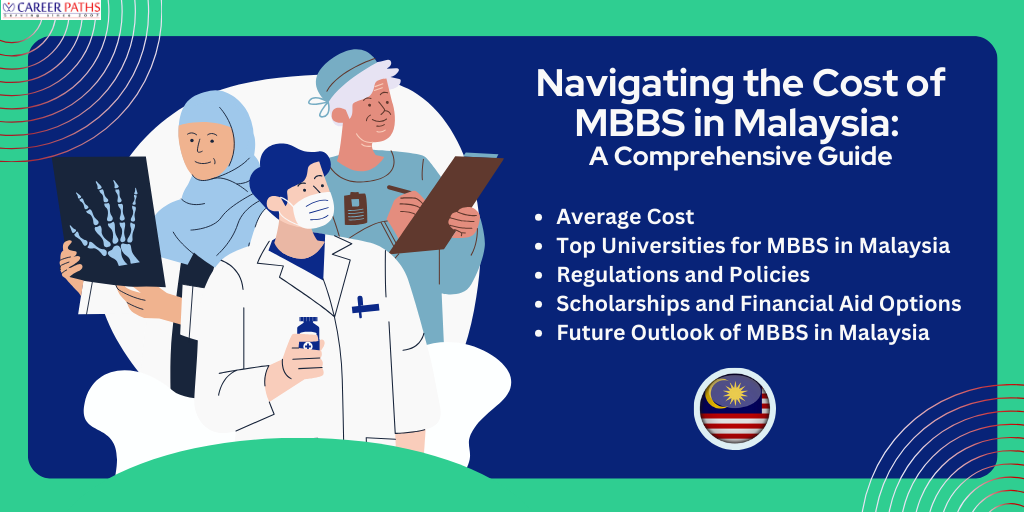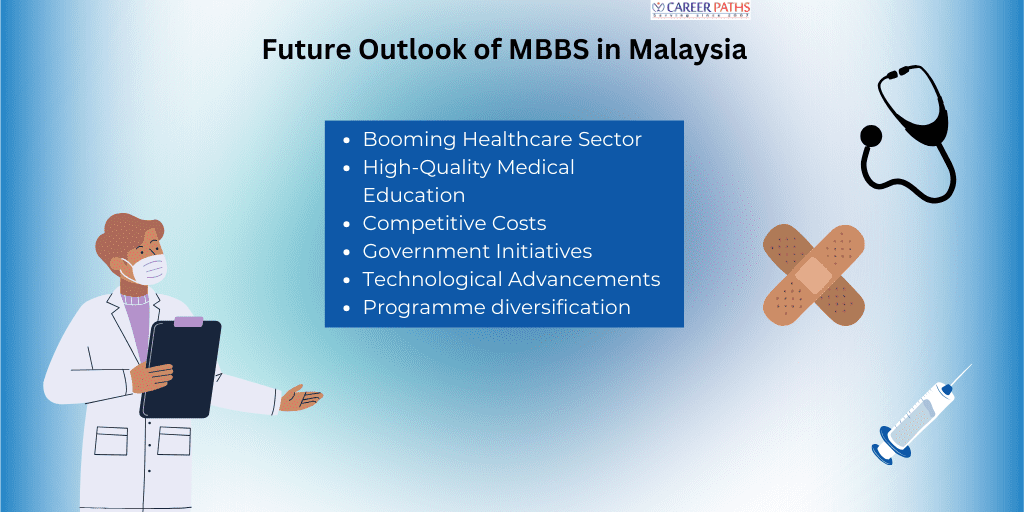
Planning is essential while starting a medical education path, particularly about finances. This thorough resource examines the cost of getting an MBBS in Malaysia and provides insightful information on living expenses, tuition, and other related charges.
From this article, you may successfully negotiate the financial terrain of your medical journey in Malaysia and make well-informed judgments about your future studies by comprehending the breakdown of prices and comparing costs with other nations.
Average Cost of MBBS in Malaysia
The following table displays the average MBBS cost in USD for Malaysia:
| Cost Component | Average Cost (USD) |
|---|---|
| Tuition Fees | 1,26,000 |
| Accommodation | 31,500 |
| Living Expenses | 21,000 |
| Books & Supplies | 6,300 |
| Visas & Permits | 3,150 |
| Travel Expenses | 6,300 |
| Other Expenses | 3,150
|
| Total Average Cost | 1,97,400 |
Top Universities for MBBS in Malaysia
Malaysia is home to several universities that provide MBBS programs. Below are a few of Malaysia’s best institutions offering MBBS programs:
Public University |
|---|
| Universiti Malaya (UM) – USD 8,575.42 per year
Universiti Kebangsaan Malaysia (UKM) – USD 9,647.34 per year Universiti Sains Malaysia (USM) – USD 10,290.50 per year Universiti Malaysia Sarawak (UNIMAS) – USD 10,719.27 per year Universiti Putra Malaysia (UPM) – USD 11,148.04 per year |
Private University |
|---|
| International Medical University (IMU) – $25,000 to $30,000
INTI International University & Colleges –
Segi University – $20,000 to 50,000 Taylor’s University – $35,000 to $70,000 Monash University Malaysia – USD 250,000 per year RCSI & UCD Malaysia – $35,000 to $40,000 Lincoln University College – $18,000 to $22,000 MAHSA University – $20,000 to $25,000 |
Regulations and Policies for MBBS in Malaysia
Through several laws and programs, the Malaysian government is vital in maintaining the caliber and standards of medical education. Here are a few crucial elements:
1. Regulatory Organisations
Malaysian Medical Council (MMC)
The MMC is the main organization in charge of licensing and overseeing physicians in Malaysia. It guarantees that medical graduates possess the necessary competencies and establishes the benchmarks for medical education.
Ministry of Higher Education (MOHE)
The MOHE is in charge of all Malaysian universities that provide MBBS programs, among other higher education establishments. It establishes the conditions for accreditation and the curriculum for medical programs.
Public Service Department (JPA)
The JPA oversees several scholarship initiatives, including medical scholarships. It establishes the requirements for eligibility and the method of selection for these awards.
2. Admission Conditions
Academic criteria
To be eligible for admission to Malaysia’s MBBS programs, overseas candidates must fulfill the basic standards. These include having a minimum CGPA and receiving an SPM or equivalent certification with required science courses.
English language competency
Tests such as the TOEFL and IELTS are required of students to prove their English language proficiency.
Medical exams
To be eligible to pursue medical education, students must pass a medical test.
3. Immigration and Visas
Student visas
To study in Malaysia, international students need to get a student visa. Several papers, such as proof of admission, evidence of financial support, and proof of health insurance, must be submitted as part of the visa application procedure.
Immigration laws
While studying in Malaysia, students are required to abide by all immigration laws. This entails keeping their visa status current and reporting any alterations to their data.
Factors Affecting the Cost of MBBS in Malaysia
Several variables might affect the price of earning an MBBS in Malaysia. Listed here are a few of the major players:
Institute
Tuition costs at various colleges vary. Public universities are frequently less expensive than private ones, with annual tuition for international students ranging from $8,500 to $10,000. On the other hand, annual fees for private colleges might reach $12,000.
Duration of the Programme
The total cost may also vary depending on how long the MBBS programme takes. While most programmes last for five years, certain institutions offer twinning programmes that combine clinical assignments in another nation with pre-clinical courses conducted in Malaysia. These courses may cost more and run longer.
Specialisation
A few universities provide MBBS programmes with a focus on surgery or paediatrics. These courses frequently have greater.
Accommodations
A big part of your costs will be determined by the kind of lodging you select. Generally speaking, shared and off-campus apartments are the most expensive options, then on-campus accommodation. A factor in pricing is location as well; lodging in major cities like Kuala Lumpur is more expensive than in smaller villages.
Cost of Living
When measured against other industrialised nations, Malaysia’s cost of living is quite cheap. Your unique spending patterns and way of life will, however, determine your actual costs. Your total cost of living will be influenced by things like entertainment, utilities, food, and travel.
Books and Medical Supplies
During their studies, medical students need to have access to a range of textbooks, equipment, and resources. Budgeting appropriately is crucial since these costs may mount up over time.
Visas and Permits
Extra costs apply when applying for a residence permit and student visa. Depending on your country and how long you want to remain, these costs change.
Trip Costs
You should include in your budget the price of your trip to and from Malaysia. This covers travel expenses such as flights, visa fees, and local transportation.
Additional Costs
Health insurance, extracurricular activities, and other needs could come with additional fees. Setting up a small amount of cash for these unanticipated costs is important.
Current Exchange Rates
The value of the Malaysian Ringgit (MYR) varies concerning other currencies. Your education costs may increase if you are paying for living expenses or tuition in a foreign currency.
Governmental Policies
The price of MBBS studies may also be impacted by these policies. For instance, modifications to tuition fee subsidies or visa requirements may have an impact on your overall spending.
You may control the expense of pursuing an MBBS in Malaysia and fulfil your ambition of becoming a doctor by being aware of these aspects and setting aside enough money for it.
Scholarships and Financial Aid Options in MBBS in Malaysia
Getting an MBBS can be costly in Malaysia while being less expensive than in many other countries. There are several financial aid options and scholarships available to lessen the financial strain on students.
Some of the most popular choices for financial help and scholarships are as follows:
Government Awards
International Scholarships from Malaysia (MIS)
For overseas students pursuing master’s and doctorate degrees, this esteemed award pays for tuition, living expenses, and additional costs. This might be an option for outstanding students who are interested in research and additional specialization, even if it is not immediately related to MBBS.
Programs of the Public Service Department (JPA)
The JPA provides financial aid to Malaysian students pursuing medical studies both domestically and overseas. These scholarships give a monthly stipend in addition to covering tuition costs.
The Ministry of Higher Education offers scholarships.
Malaysian students can apply for medical scholarships from the Ministry of Higher Education.
These scholarships may come with other perks in addition to usually covering tuition.
Academic Scholarships at Universities
Merit-based scholarships
To entice students who excel academically, several colleges provide merit-based scholarships. A portion or perhaps the entire cost of tuition may be covered by these scholarships.
Need-based scholarships
Numerous institutions provide need-based scholarships to students who can demonstrate their financial need. The cost of tuition and other expenses may be partially or fully covered by these scholarships.
Scholarships for specialization
Financial help is offered by several universities to students who wish to specialize in medicine. These scholarships might cover a portion of the tuition or provide additional income.
Individual Scholarships and Awards
Foundations and organizations
Numerous charities and organizations provide scholarships and grants to students who are pursuing medical school. These grants may be given out according to need, merit, or other standards.
Corporate scholarships
Some corporations offer scholarships to students who are interested in working for them after graduation.
Religious organizations
Students who identify as members of certain religious organizations may be eligible for scholarships.
Loans for Students
Government Loans for Students
The Malaysian government provides a range of student loans to assist students in covering the cost of their education. These loans often include flexible repayment schedules and cheap interest rates.
Private Loans for Students
Student loans for overseas students are provided by private banks and financial organisations. On the other hand, these loans could have shorter payback periods and higher interest rates.
Future Outlook of MBBS in Malaysia
The prospects for MBBS in Malaysia seem bright, propelled by many important factors:

Booming Healthcare Sector
An ageing population, more public awareness of healthcare, and rising government spending are driving substantial expansion in Malaysia’s healthcare sector. This results in an increase in the need for trained medical personnel, which benefits MBBS graduates by establishing a beneficial job market.
High-Quality Medical Education
Malaysian institutions with MBBS programmes are well-known across the world for their strict standards and excellent instruction. International students who want a medical degree that is globally recognized and has a solid basis in clinical skills and medical knowledge are drawn to this school because of its reputation.
Competitive Costs
Malaysia’s MBBS programme is still reasonably priced when compared to other developed nations, which attracts students looking for an economical medical education. To help lessen the financial load, the government also provides a range of financial aid choices.
Government Initiatives
By funding research projects, faculty development programmes, and infrastructure, the Malaysian government actively supports medical education. The goals of these initiatives are to draw in more foreign students and raise the standard of medical education even higher.
Technological Advancements
The way that medical education uses technology is changing the way that people learn. To prepare its graduates for a future in healthcare driven by technology, Malaysian institutions are embracing cutting-edge medical technologies, e-learning platforms, and creative teaching techniques.
Programme diversification
Malaysian medical schools are adding more specialisations to their curriculum, such as geriatric medicine, sports medicine, and forensic medicine, to their MBBS programmes. In addition to satisfying personal interests, this diversification equips graduates with specific knowledge and abilities for new challenges in healthcare.
Conclusion
Even though the MBBS programme in Malaysia seems to have a promising future, it is important to be aware of possible obstacles including growing rivalry for admission and the requirement for ongoing investment in faculty development and infrastructure. But these difficulties also offer chances for advancement and creativity, which raises the standard of medical education in Malaysia even further.
All in all, MBBS in Malaysia appears to have a bright future. With a solid base in high-quality education, reasonably priced tuition, and encouraging government policies, Malaysia is well-positioned to emerge as a top choice for overseas students looking to pursue fulfilling careers in medicine.











